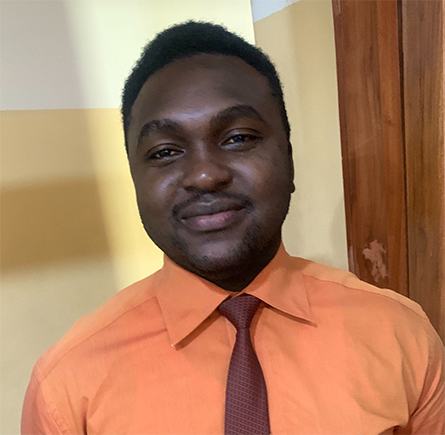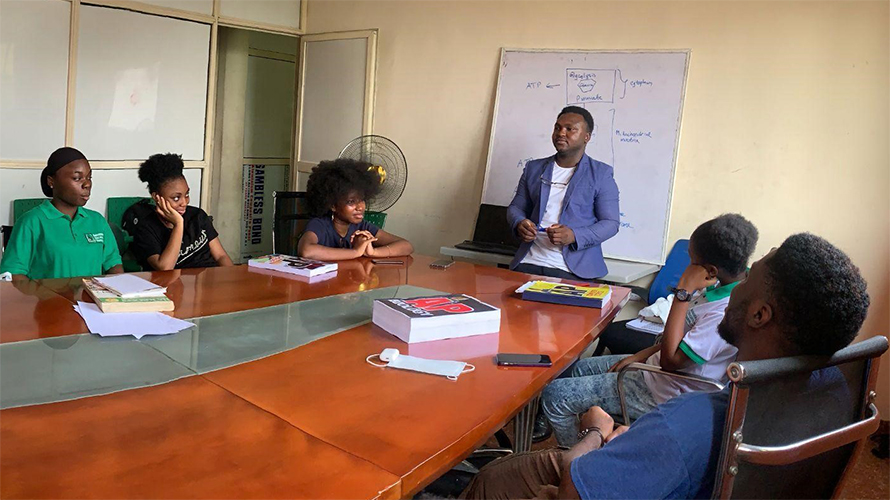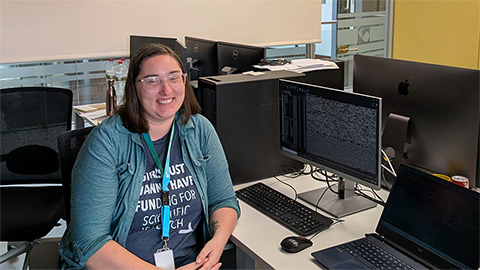
A youthful goal blocked by power failures
My career path was inspired by a health challenge that almost claimed my life. When I was a child, I suffered from marasmic kwashiorkor, a form of malnutrition. My mother had no formal education and didn’t understand my symptoms, but someone told her to feed me a mix of crayfish and a local cereal pudding called pap or ogi.

In the twilight of my slow recovery, a nurse at the hospital told my mum she was wasting her time because, in his opinion, she had a “dead child.”
That statement motivated my mum to hope against hope that I’d stay alive. And it made me want to become a doctor who could speak more positively than that nurse, even in dire circumstances. I persevered through high school to prove that a negative statement made by a health professional to a patient can be proven false. Today I am alive, healthy and a survivor.
When I was admitted into Kaduna State University, I hoped to study medicine, but I was offered a biochemistry program. I found a quote by a professor saying that biochemistry is “the beautiful bride of modern science,” and that made me think I was in the right field at the right time.
The late Andrew J. Nok, a biochemistry professor and member of the Nigerian Academy of Science, was a role model, particularly because, like me, he was a native of Kaduna State. He mentored several lecturers in my undergraduate program, and his research on parasitic diseases such as sleeping sickness was a gold standard.
For my final research thesis, I intended to extract lignin from grain husks enzymatically using the fungus Trichoderma reesei. This was one of the objectives in my research plan; however, I was unable to procure the fungus from any nearby laboratory. I was pressed for time, and the challenge was never solved; I had to adjust my objectives. I never searched farther for the fungus, and I did not continue my quest of delignification in my research.
It took me some time to understand why laboratories in Nigeria have difficulty procuring essential biological samples and reagents. I finally hit on the issue of power failure. Labs expend scarce funds acquiring samples only to see them ruined and wasted by electrical outages. Studies are compromised, and even scientists who manage to preserve samples cannot be confident in the research outcome.
Power outages are largely a political problem. Political elites make false promises in a bid to gain votes during election season, and aspiring leaders always say they will resolve electrical issues. Unfortunately, they always don’t. This is largely because many former civil servants are key private shareholders of the Power Holding Company of Nigeria. Others have invested in the supply, manufacturing and coupling of industrial generators and would lose money if the electricity issue is resolved. It appears that nothing is being done to improve the situation.
This lack of a steady power supply is a vicious drag on research, hampering the storage of biological substances or samples that require freezing or cryopreservation. And while many scientists are willing to run generators, funds and grants aren’t easy to come by.
Instead of doing research to find cures for disease, I am now a teacher and a graduate student at Ahmadu Bello University in a master’s program in public health epidemiology. I no longer face the challenges of working in a lab.
Many scientists in Africa develop and execute novel research, collecting data to move their work forward. I hope some of my students and I someday will be among them.

Enjoy reading ASBMB Today?
Become a member to receive the print edition four times a year and the digital edition monthly.
Learn moreGet the latest from ASBMB Today
Enter your email address, and we’ll send you a weekly email with recent articles, interviews and more.
Latest in Opinions
Opinions highlights or most popular articles

Women’s health cannot leave rare diseases behind
A physician living with lymphangioleiomyomatosis and a basic scientist explain why patient-driven, trial-ready research is essential to turning momentum into meaningful progress.

Making my spicy brain work for me
Researcher Reid Blanchett reflects on her journey navigating mental health struggles through graduate school. She found a new path in bioinformatics, proving that science can be flexible, forgiving and full of second chances.

The tortoise wins: How slowing down saved my Ph.D.
Graduate student Amy Bounds reflects on how slowing down in the lab not only improved her relationship with work but also made her a more productive scientist.

How pediatric cataracts shaped my scientific journey
Undergraduate student Grace Jones shares how she transformed her childhood cataract diagnosis into a scientific purpose. She explores how biochemistry can bring a clearer vision to others, and how personal history can shape discovery.

Debugging my code and teaching with ChatGPT
AI tools like ChatGPT have changed the way an assistant professor teaches and does research. But, he asserts that real growth still comes from struggle, and educators must help students use AI wisely — as scaffolds, not shortcuts.

AI in the lab: The power of smarter questions
An assistant professor discusses AI's evolution from a buzzword to a trusted research partner. It helps streamline reviews, troubleshoot code, save time and spark ideas, but its success relies on combining AI with expertise and critical thinking.

